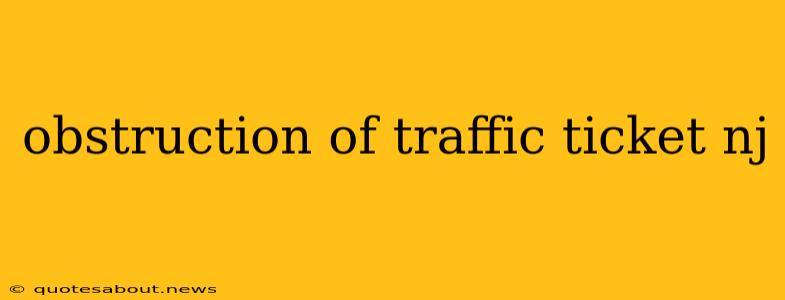Obstructing the flow of traffic in New Jersey can result in a traffic ticket with potentially serious consequences. This guide provides a comprehensive overview of the relevant laws, potential penalties, and strategies for handling such a ticket.
Understanding NJ Traffic Obstruction Laws
New Jersey Statute 39:4-67 outlines the offense of obstructing the passage of a vehicle or pedestrian. This isn't just about causing a complete standstill; it encompasses any action that unreasonably impedes the normal and reasonable flow of traffic. This could include:
- Improper parking: Parking in a no-parking zone, blocking a fire hydrant, or obstructing a crosswalk.
- Sudden stops: Stopping abruptly without a justifiable reason, causing a chain reaction.
- Slow driving: Driving significantly slower than the posted speed limit, particularly if it causes a backup.
- Driving in a hazardous manner: Weaving through traffic erratically, making sudden lane changes without signaling, or generally driving in a way that creates a risk of collision.
- Double parking: Parking alongside another vehicle, partially or fully blocking the road.
The severity of the offense depends on the context and the extent of the obstruction. A minor parking violation might result in a relatively small fine, while a more serious incident causing a significant traffic jam could lead to higher fines and even points on your driving record.
Key Considerations:
- Intent: While intent isn't always a necessary element for a conviction, the circumstances surrounding the obstruction will be considered. A genuine emergency, for example, might mitigate the penalty.
- Location: The location of the obstruction is crucial. Obstructing traffic in a busy urban area carries more weight than a similar offense in a sparsely populated area.
- Consequences of the obstruction: Did the obstruction cause an accident, near-miss, or significant traffic backup? This significantly impacts the potential penalties.
Penalties for Obstruction of Traffic in NJ
Penalties for obstructing traffic in New Jersey vary depending on the specific circumstances and the judge's discretion. They can include:
- Fines: Fines can range from relatively low amounts for minor infractions to hundreds of dollars for more serious offenses.
- Court Costs: Additional costs associated with appearing in court.
- Points on your license: Accumulation of points can lead to license suspension or higher insurance premiums.
- Increased insurance premiums: Even without points, an obstruction of traffic conviction can trigger a rate increase from your insurance provider.
Fighting an Obstruction of Traffic Ticket
If you receive a ticket for obstructing traffic, you have several options:
- Paying the fine: The simplest option, but this constitutes an admission of guilt.
- Pleading guilty with an explanation: Allows you to explain the circumstances to the judge, potentially leading to a reduced fine.
- Pleading not guilty and contesting the ticket in court: Requires more effort and preparation, but offers the chance to have the ticket dismissed if you can successfully challenge the evidence presented by the officer. Consider seeking legal counsel if pursuing this route. A lawyer specializing in traffic violations can provide valuable assistance.
Gathering Evidence: If you choose to contest the ticket, gather any evidence that supports your case. This could include:
- Photos: Pictures of the scene, demonstrating the lack of obstruction or extenuating circumstances.
- Witness statements: Testimony from anyone who witnessed the event.
- Police dashcam footage (if available): This can provide objective evidence of the situation.
Prevention is Key
The best way to avoid an obstruction of traffic ticket is to drive safely and responsibly. This includes:
- Following traffic laws: Obey speed limits, traffic signals, and parking regulations.
- Being aware of your surroundings: Pay attention to other vehicles and pedestrians.
- Driving defensively: Anticipate potential hazards and react accordingly.
Obstruction of traffic is a serious offense in New Jersey. Understanding the law and potential consequences is crucial for all drivers. Remember to always prioritize safe driving practices to avoid facing these penalties. Consult with a legal professional for personalized advice if you receive a ticket or have questions about your rights.

